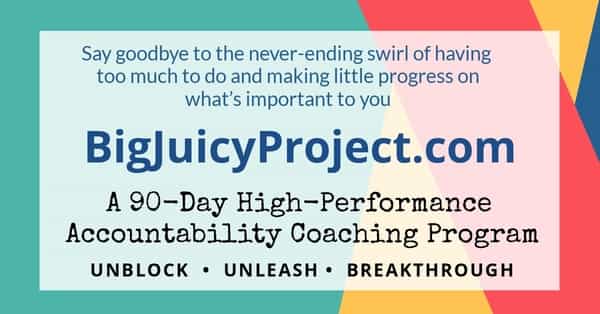Lots of actors say they’ve done everything they know to do and are still not achieving the goals they want, still not getting enough auditions.
This two-part article series is meant to help you set your goals and then break them down so you have actions to take on a daily basis.
Whether it’s getting an agent or manager, getting a certain number of auditions, making a set number of new industry connections, or something else, it’s critical to set your goals and make a plan for how to achieve them.
How do you do this?
You create and execute a plan for two types of goals.
First, let’s look at what the two types of goals are:
- Results Goals: These are the final results you want to produce, such as getting auditions and ultimately booking jobs. These results require that others make decisions in your favor. I’ll be covering this in depth below in this article.
- Action Goals: These are the actions you take to produce the results you want — actions that you have control over and can do on your own. These action goals should center around doing the things you think will help you to achieve your Results Goals. In part 2 of this article, I’ll cover Action Goals more in depth.
Now let’s look at why you need to have both Results and Action Goals in your plan.
Your main Results Goal might be to get cast on a TV show.
To accomplish that goal, you need auditions. You can’t directly make someone call you in for an audition or cast you, so you need to figure out what actions you can take that might lead you to getting more auditions (and therefore more opportunities to be cast). So the question is: what actions (that are in your control) can you take that might lead you to getting more auditions?
Actions which don’t directly produce the results but DO feed into creating opportunities are called key indicators. Your action goals should revolve around what you identify as your key indicators — the critical actions that will create opportunities for the bigger goal.
Increase Your Number of Auditions
Let’s say you want to up your number of auditions. In this case, you need to increase the number of casting directors who know you. And even better, increase the number of those who know you and also cast your type on their shows.
One key indicator you might take on could be centered on expanding the number of casting directors who know you. Your goal might be to add 4 or 5 CDs to your contact list for the quarter.
To reach that goal, one of your actions might be to do one casting director workshop per week and then follow up twice with the casting director afterwards. That would be one type of action, and of course you could create more. Maybe your goal of adding 5 casting directors is even more specific with something like: “Get 5 casting directors who cast my type on their show to watch my demo reel and say they will call me in.” The idea is that your focus is on expanding the number of casting directors who could call you in and cast you.
Most importantly, you first need to set your two types of goals, then you’ll need to schedule when you will take the actions. Now let’s look at setting the goals. Here are the steps tor setting your Results Goals:
1. Create your vision for your Longer-Term Results — approximately 18 months out.
What do you want to achieve in the next 18 months? If you really want to achieve it, you need to make a plan for how you intend to do so.
Yes, you could get lucky and have a windfall with something miraculous happening out of the blue, but to make sure that things move forward, you should begin to map out a pathway you think will get you there. Even though you don’t have control over the final result, the idea is to get as many factors working in your favor as possible and then amp up the actions as much as you can.
If you don’t plan and then take he actions to get you there or at least greatly increase your odds and your opportunities, then you are relying ONLY on a miracle to make it happen — like being discovered sitting on a bar stool at Schwab’s Drugstore in Hollywood as the legend says happened with Lana Turner. A much better idea is to have a strong plan in place (with key indicators) and take responsibility for following through on the actions you have identified that you think will help you achieve the Results Goals you set.
2. Break your long-term goal down into intermediate milestone Results and Actions by Quarter.
Once you identify your 18-month goal, your next step is to work backwards by quarter and break down your longer-term goal or vision into the quarterly projects or milestones that need to take place along the way. This will help keep you on track over a longer period of time.
For example, if you want to be a series regular on a new show, you would work backwards from that 18 months and some of the milestones along the way might be:
- Prior to becoming a Series Regular, you might need to book a Series Regular Role on a pilot.
- … And prior to booking the role on the pilot, you need to start getting auditions for network TV shows.
- … And prior to that you need to get an agent or manager who can get you out.
- … And before that you might want to become eligible to join the union.
For each milestone or accomplishment that is not directly in your control, identify what actions would create a foundation to get you there.
3. Set your Monthly Action and Results Goals.
Once you have your Goals for the Quarter, now it’s time to break it down for what you need to achieve each month of the quarter. Some actions might be to get new headshots, do an agent mailing, pay your money to join SAG, and so on.
For the current month (and maybe the next one too), brainstorm all the actions that you could take to help you reach your goal that month.
4. Set your Weekly Actions.
Once you know what you need to achieve THIS MONTH, now you need to break it into a week-by-week plan. What do you need to accomplish this week with your key indicators?
5. Set daily action goals.
And finally…. you set your daily action goals. Maybe your weekly goal is to add 1 more casting director to your list of who knows you and would cast you. How will you accomplish that? Maybe you set a daily goal to locate a Casting Director’s Facebook, Twitter, or Linked In page, and then start interacting with their posts or tweets daily. Maybe you do this for 10 different ones for this week, then repeat it next week, so that you’ll get at least a couple more CDs to know who you are.
For the Daily Actionable Goals, write down exactly what you will do each day to achieve the current week’s goals. That becomes your road map of exactly what actions you need to take to achieve that month’s goals, which in turn affects everything going forward.
Summary of Part 1
Many actors fantasize about what it would be like to work alongside a big star like Jennifer Lawrence, Brad Pitt, or Al Pacino. Others dream of having a Series Regular Role — steady work with good pay! But those goals often seem to be a long way off and and you often feel like it’s totally out of your hands to cause it. This is common and it’s normal to feel like this.
The key, however, is that instead of only thinking about the big goals, break them down and down and down until you know what to do on a daily basis. When you have clarified your plan and you see the direct correlation to the long-term results you want, that will be much more motivating than only taking one big action every so often when you get inspired.
If you have a big goal for your acting career, you need to have a plan for how you will achieve it through your own actions — those actions being ones that set up the conditions for someone else to cast you.
When you break these big goals down into milestones by quarter, month, and week, you’ll start to see actions you can literally take on a daily basis. Goals that are within your reach are far more inspiring and rewarding in the short term. Create your plan as described above in this article.
As you make your plan, think of what resources (other people, services, companies) you could all on to help you in your pursuit. High-achievers are only able to accomplish so much because they have a team of people on board with their vision, their goals. Likewise, you too might want to offload some of what you see needs to be done.
The point on this is that when you take responsibility, it does not mean that you have to do everything yourself, it means that you are the one in charge of making things happen — either directly or indirectly. You can hire people to help you if that’s what you want. If you need to meet with your agent and have a reset on your casting, that’s up to you, not the agent. You are the top level manager of your own career and it’s up to you to create a team of people to support you in your efforts.
Smart Girls Productions, for example, has helped thousands of actors like you get their agent or manager. We exist specifically to provide services to help you achieve your goals. Just like you might hire an attorney for their expertise — but you have the final say, you might hire Smart Girls to help you with your cover letter and research on agents and managers.
Look for opportunities to add people to your team. Hiring a photographer is an example. You should not be doing your own headshots, but instead find a great photographer.
Another example… you might find the kind of support you need in my latest program called Big Juicy Project which is designed to take on a project for one quarter, plan how to reach it, then provide a structure for accountability in making it happen in 90 days or less.
In the Big Juicy Project program we implement something along the lines of what is described in this article. But the real value is that each week you will be held to account to complete your promises –– and that in turn, makes it 1000 times more likely that you will follow through and finish it.You can learn more about it here:
 As a final note, when you create your plan for achieving your goals, one of the key elements for accomplishment is accountability. You can make all the plans you want but the follow-through can be a challenge if you don’t have someone to be accountable to.
As a final note, when you create your plan for achieving your goals, one of the key elements for accomplishment is accountability. You can make all the plans you want but the follow-through can be a challenge if you don’t have someone to be accountable to.
While you need to be responsible for having a plan to fulfill your Acting Career Goals, you don’t have to literally do everything yourself — YOU just have to be the boss.
No one cares more about your career than you, so it’s time to start planning how to reach your goals.
If you like the idea of taking a structured approach to your goals with accountability, then the Big Juicy Project! program may very well be a good fit for you. Go check out the page on Big Juicy Project and see if it resonates with you.
However you may want to do it, the important thing is to take responsibility for making your plan and then executing it.
In part 2 of Success in Acting, I cover some of the actions you can take to produce the results you want.


